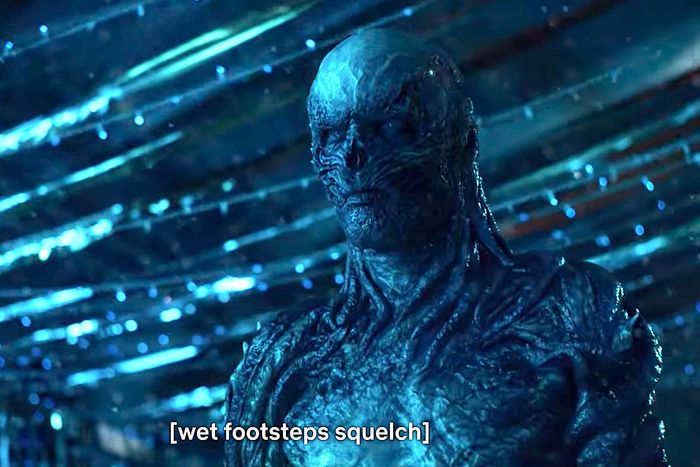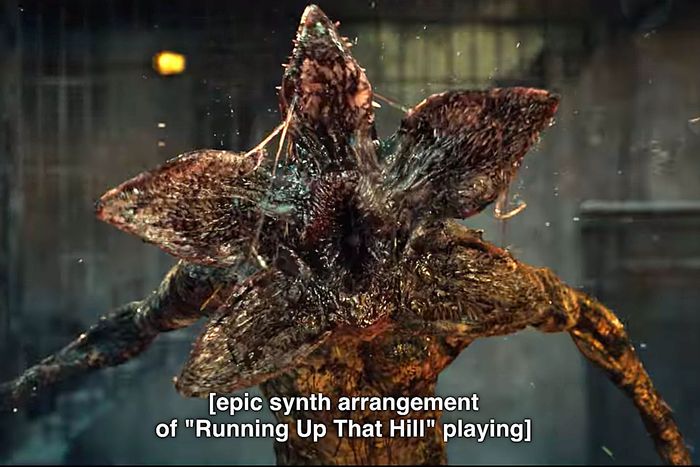
Stranger Things evoked a lot of emotions this season — especially if you flipped on your subtitles setting. Those subtitles became a sensation among fans: [Tentacles undulating moistly], [wet footsteps squelch], [tense music intensifies] are as memorable as Vecna himself.
And part of the recent increase of emotive descriptors across Netflix originals is due to the company’s English Timed Text Style Guide, an ever-changing set of rules for subtitlers, Netflix’s director of globalization Kathy Rokni tells me. “Use adverbs where appropriate,” Rokni says. “Describe sounds, music, and even silence. It’s important if it adds to the emotion.” The style guide shifts and evolves as Netflix’s content grows to improve the streamer’s accessibility and subtitling, giving deaf and hard-of-hearing viewers the same immersive experience of tentacles squelching and roiling wetly as hearing mass audiences. The latest addition to the style guide, around 2020, was for subtitlers to be more detailed. “The first show we started seeing this positive feedback that encouraged us to think we were going in the right direction was Bridgerton [season one].” And thus, the sensational, nearly no-holds-barred descriptive subtitles of Stranger Things 4.
While Netflix’s recent efforts have enabled its creative writers to let as loose as they can on a 42-word-count line, all credit of the phonetic mastery of Stranger Things 4 goes to the show’s subtitle author Jeff T. (he preferred we not share his full last name) and his subtitle QA editor Karli Witkowska. When I first asked to interview them, they first thought my request was surely sent to the wrong people. “Our little corner of production is rarely seen,” Jeff quipped. Still, they opened up about their accessibility work on Stranger Things, the memes they’ve spawned, and, yes, Dungeons & Dragons Easter eggs.
Let’s start with some background — how did you guys get into the subtitles business?
Jeff: I answered a Craiglist ad 15 years ago, and that goes to show how much of a dinosaur I am, thinking about when people used to find jobs on Craigslist. [laughs] Nothing terribly exciting. I fell into it, but I really love this side of the industry. When I was a kid, I thought, Oh, don’t they just create subtitles through a machine? I didn’t understand the care and diligence that a good subtitler makes and the difference they make within a whole community. It’s been an accidental vocation, but one I’m happy to call mine.
Karli: I didn’t even know that about Jeff’s story, so I’m happy to hear that as well. My story is very different from Jeff’s. I came from academia, so I actually studied translation at uni. I thought about being a subtitler right from the get-go. I actually went back and got my master’s in audiovisual translation (subtitling, voice-over, audio descriptions). Every decision or choice I make is coming from research and what the deaf community wants and needs.
How long have you two been subtitling for Stranger Things?
Jeff: I don’t think you’ve worked on previous seasons, correct? I worked on season three in Karli’s role. Seasons one and two went through a different process, I believe, so we didn’t touch those.
Karli: I was so happy to get the request for this season. [Stranger Things is] one of my favorite shows, so even though I knew I would be about nine months pregnant when it was released, there was no way I could say no to this. It’s one of those requests where you’re waiting for it to come along.
Jeff: I rearranged my entire schedule, four months of work, just to make room for this.
Karli: The process is quite long. There’s a lot of people involved, so it goes through a lot of different stages before it gets to the version you all see. There’s tons of linguists who take part and create work for all the various languages you can see the show in.
What do you all work with? Scripts, rough cuts? Notes from the Netflix team?
Jeff: We sometimes get shooting scripts, but that can differ greatly from what gets put on-camera, so if we’re lucky we get those as references for things like characters, location names — but a lot of it, we have to stay as true to audio as possible. The No. 1 source of our authenticity is our audio.
Karli: Since we’re trying to create something that the deaf community can follow as well as we can as the hearing audience, our final decisions have to be made at the last minute when we have the full version. The deaf and hard-of-hearing community isn’t just people who have been deaf from birth; it’s also people who have lost their hearing or have partial hearing, so it’s important to strike a balance of creating descriptors that describe the sounds but also evoke the emotion, so they can relate to these shows too.
Jeff: Especially on a show like Stranger Things where sound is so integral to the way the story is told. It’s not an afterthought. Everything is done with intentionality, with purpose. I think the Duffers are keenly aware, it seems to me, of the tradition they’re playing in. They’re engaging in the great horror movies, the creature features, right? They know that the slow, steady escalation of a single solitary note can draw the anticipation and dread from that. They know what the value of a stinger is, so for us, it’s crucial to have full access to that audio on a show like this, so we can then replicate that faithfully.
Karli: When it comes to a show like ST where you have something so fun and upbeat like when they’re riding along in the pizza van, and then all of a sudden, something completely different happens, it’s our job that the deaf community can still understand that complete switch of atmosphere and tone. If we aren’t doing that, we aren’t doing our jobs correctly.
The range of words you use is impressive. How do you keep your word banks so sharp?
Jeff: I’m a word nerd, and this [project] was a perfect marriage for me because I have been playing Dungeons & Dragons for about 20 years. Right before the pandemic, I wrapped up my own four-year-long campaign, so I am intimately acquainted with the conventions of Dungeons & Dragons, which is obviously so crucial to Stranger Things, but I am also a huge sci-fi fantasy nerd. I read a lot of authors like China Miéville, Jeff VanderMeer, and others who are engaged in the new weird movement of the 2000s. I love authors who use evocative words and language to do their world-building, so I will freely admit that whenever I’m reading and see a word that’s great, I steal it to put in my word bank. I do have a word bank that I consult for most of my shows, but I don’t have to break it out a ton because not every show has the intentionality of sound like Stranger Things has.
I try to stick to genre-appropriate language as well. People brought up the squelching, but that palpable pressing sound is meant to evoke disgust and horror. If I was doing a Regency-era picture or a stoner comedy, I’d change my language and shift accordingly, but I tried to be respectful of the genre [in Stranger Things season four].
Karli: Working with Jeff on this, I had to think about whether every sound and every descriptor provides the necessary required emotions or feelings that the deaf community would require. In this case, I could rely on Jeff that the language would be there. There will be descriptors in there that I think would be perfect for the hearing audience but not as great for the deaf community; as long as it’s portraying the correct sound, I think we’re doing our best to create something for everyone.
I’d love to know about words that didn’t make it in.
Jeff: There’s the scene where Henry/Vecna/001 is creating the Mind Flayer. I remember listening to the sound design and it reminded me a lot of the sound design of Arrival. The atonality is meant to get at an alien harshness, so one of the tags I used — and I chose this word because Karli and I wanted to go big; we wanted to bring our A-game — was “[unearthly susurration]”. I chose “susurration” because it’s an alien word that automatically makes you go, Oh, this is unusual, strange, and eerie. But also, I liked the fictive sense of it, like when you say “susurration,” it feels like it’s scraping the inside of your ears. Karli thought it was great but said, “Let’s have ‘unearthly’ do the heavy lifting here. This is a bit much.” And she was dead right!
Karli: The only reason I said that is because I had to think about the word and what it meant for a bit. I didn’t want the audience watching to wonder what that word means. In any other context, that word would’ve been perfect. I don’t feel like there was anything else I said no about.
Jeff: Karli is the best editor. You can go big, but when you cross the “susurration” line, I’ll pull you back in.
Did Netflix or the Duffer brothers themselves say anything to you about what they wanted from the subtitles this season?
Karli: Netflix has always been quite keen on giving us creative rein for the subtitles for the deaf and hard-of-hearing. Genres change and they deserve different things. This show wouldn’t be what it is without that atmosphere-building. We know Stranger Things is on a big world’s stage, so every intention matters from the start to the end.
Jeff: If it was just two music notes for “Running Up That Hill,” like what would that get you?
“Epic synth arrangement of ‘Running Up That Hill’” sounds much better.
Jeff: It was pretty epic! The Totem remix is chef’s kiss.
Karli: It’s great that now when you drive down the road, you can hear Kate Bush playing on the radio. It’s fantastic.
There is one curious word you use: “Eldritch.” I’m sure Vecna gave you more to play with, but I was wondering about “eldritch” because I don’t recall ever seeing Eleven’s powers being described that way. I could be wrong.
Jeff: A creation like Vecna really allows me to get as florid and over the top as I want to because it’s a perfect mix of marriage of the material. “Eldritch” is a good word for [his powers], but also because it’s a reference to Dungeon & Dragons. There’s this warlock … I’m trying to figure out how nerdy I should get here. The warlock class, which is one of the classes you can play in D&D, their signature spell is “Eldritch blast,” and they are a class that has made a deal with an alien in power, whether it’s a demon or an Archfey, or whatever it is. I also thought it was a great word for the tactile sensation of it. The reference to making bargains with forbidden powers was a great nod too. I added a couple of Dungeons & Dragons references, actually. There was a two-fer! Nobody’s caught it yet, and I am extremely online, so if people have tweeted or posted about this on Reddit, chances are I’ve seen it. I was hoping somebody would pick it up.
Karli: I’ve been searching too!
Jeff: In the “Henry/Vecna/001 creating the Mind Flayer” scene, I also used the tag “[dissonant gibbering]”, which is a reference to two Dungeons & Dragons spells. The first is “dissonant whispers,” which is a bard spell. It’s supposed to be — God, I am irredeemably nerdy.
No, this is great. I welcome it.
Jeff: So, “dissonant whispers” is a bard sliding into your mind to break down your defenses. Then there is “gibbering.” There’s a monster called the Gibbering Mouther, which is basically a pile of goo with mouths and teeth meant to drive people crazy, so I thought, Let me put this here, because that’s exactly what this giant swirling particle monster is.
Karli: I’ll sometimes stare online to try to figure out why it’s important, but that’s the best thing about having someone like Jeff work on a title like this. He’s perfect for the genre, and I come and make sure it’s perfect for the deaf community.
So these words definitely don’t come from notes from the Duffer brothers or from their script.
Karli: We haven’t had any contact from them yet! But maybe one day.
Jeff: Our DMs are open.
Many of the subtitles are being lovingly memed on social media. It’s become a hallmark of the show. How does that feel for you guys?
Karli: It’s exceptional news for us. Subtitling for the deaf and hard-of-hearing is first and foremost an accessibility feature. That’s why it’s there, but to see it be opened to a new audience is unbelievable. In my entire career, I’ve never seen anything be so well received.
Jeff, I know you’re chronically online — have either of you seen a meme or screenshot that you’ve been loving?
Jeff: Honestly, “[tentacles undulating moistly]” I’ve seen a lot. I will admit I was trolling a little bit with that. Also, in the past year or two, I’ve been watching ASMR streams to figure out which words elicit that kind of response in people, so I’ll grab them and put them in my word bank. “Moistly” pops up a lot in those ASMR streams.
Karli: It’s a word where I can name six or seven of my friends who don’t like it. It is supposed to be an uncomfortable situation, and that’s why it was used in the show. What I’ve noticed quite a lot online are people who don’t really understand the subtitles are for the deaf and hard-of-hearing. I’ve seen a lot of, Why are the subtitles so overly descriptive? We don’t need these. And I know you don’t, but you weren’t the main audience for subtitles from the start.
Jeff: I have a couple Reddit threads saved, and one of them was a post where somebody said, ‘The subtitles this season are the subtitling version of Eminem’s ASL interpreter,” going completely ham and interpreting it as an entirely new and innovative method of communication. I loved that. I don’t know if you’ve seen his interpreter, but they just throw their whole body into it.
There’s this thread on the deaf-community sub-Reddit where someone asks, “What is your opinion as a deaf or hard-of-hearing person?” It’s a smallish thread, but everybody seemed very uniformly like, “This is a level of specificity and oral description that we’ve never encountered,” and they said, “You know what, if it is over the top, that’s more information for us, which we never get.” And I think that’s great to give them that. My friend is actually hard-of-hearing in one ear, and he said, “This is the first time where I just felt like I didn’t miss out on anything.” I got a little teary-eyed.
I can imagine that’s way more gratifying than a meme.
Jeff: Everyone loves a meme! I have so many of them saved. I love “[Eleven pants]”.
Karli: I love that one too!
If you had to write a subtitle to describe your mood after Stranger Things 4, what would it be?
Karli: Well, given that I’m a new mom, I’m “[absolutely exhausted].” I’m kidding.
Jeff: You sniped exhaustion from me. I was going to say “[triumphant exhaustion].”
Karli: That’s a really good one. I’m going to say “[proudly giddy].”






